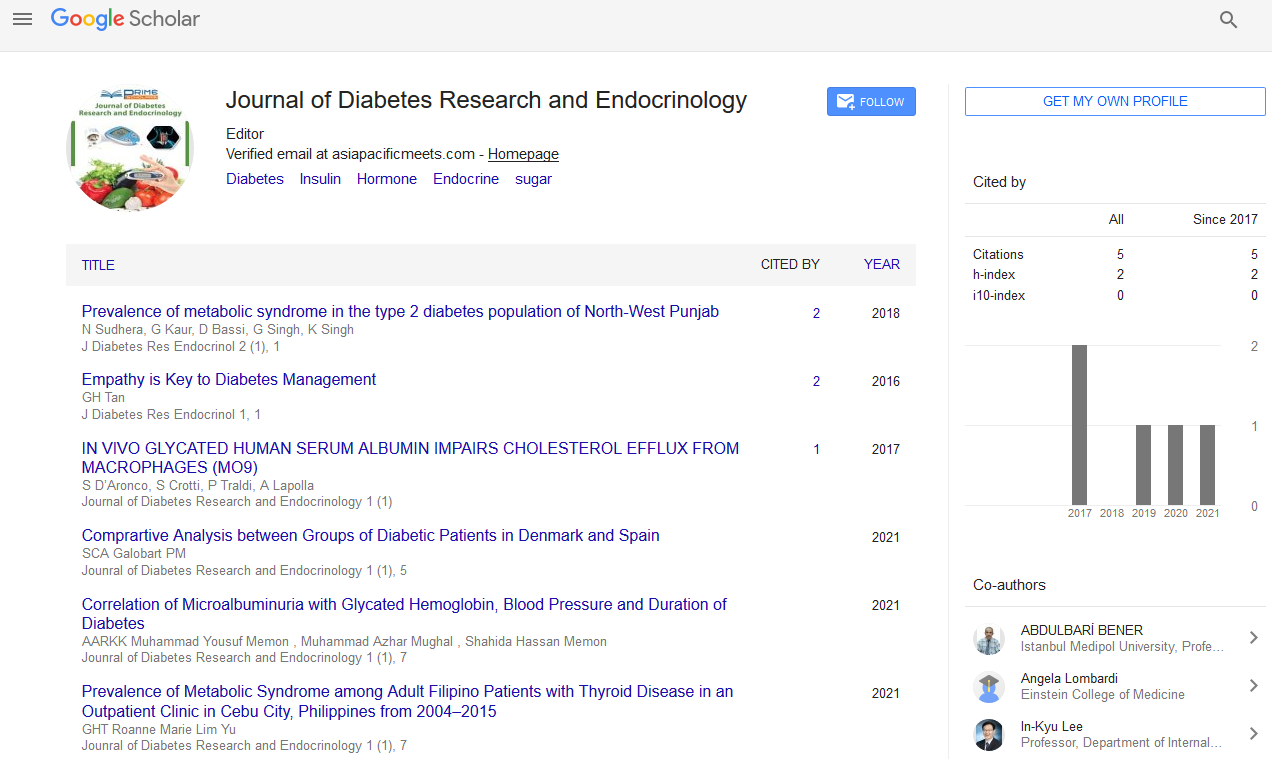Short Communication - (2024) Volume 8, Issue 1
Understanding Diabetes: An Overview of Types, Management, and Future Directions
Olivia Johnson*
Department of Endocrinology, Buckingham University, UK
*Correspondence:
Olivia Johnson,
Department of Endocrinology, Buckingham University,
UK,
Email:
Received: 28-Feb-2024, Manuscript No. IPJDRE-24-20057;
Editor assigned: 01-Mar-2024, Pre QC No. IPJDRE-24-20057 (PQ);
Reviewed: 15-Mar-2024, QC No. IPJDRE-24-20057;
Revised: 20-Mar-2024, Manuscript No. IPJDRE-24-20057 (R);
Published:
27-Mar-2024, DOI: 10.36648/ipjdre.08.01.01
Introduction
Diabetes mellitus, commonly referred to as diabetes is a chronic
health condition that affects how the body turns food into
energy. When someone has diabetes their body either doesn’t
make enough insulin or can’t effectively use the insulin it does
produce. Insulin is a hormone made by the pancreas that allows
cells to absorb glucose from the bloodstream to use as energy.
Without adequate insulin function blood glucose levels remain
elevated leading to various health complications. This article
provides an overview of diabetes its types and the current
and future directions in its management. Diabetes is primarily
classified into three main types: Type 1, Type 2, and gestational
diabetes. Type 1 diabetes is an autoimmune condition where
the immune system attacks and destroys the insulin-producing
beta cells in the pancreas. This form of diabetes is typically
diagnosed in children and young adults although it can occur
at any age. Individuals with Type 1 diabetes must take insulin
injections or use an insulin pump to manage their blood glucose
levels. Without insulin the body cannot utilize glucose for energy
leading to high blood sugar and potential complications. Type
2 diabetes is the most common form of diabetes and is often
associated with lifestyle factors such as poor diet of exercise
and obesity. In Type 2 diabetes the body becomes resistant to
insulin or doesn’t produce enough insulin to maintain normal
blood glucose levels [1,2].
Description
This type is more commonly diagnosed in adults but is
increasingly seen in younger populations due to rising obesity
rates. Management includes lifestyle changes oral medications
and sometimes insulin therapy. Gestational diabetes occurs
during pregnancy when the body cannot produce enough
insulin to meet the increased needs. This type of diabetes
typically resolves after childbirth but increases the risk of
developing Type 2 diabetes later in life for both the mother
and the child. Proper management during pregnancy is crucial
to prevent complications. The primary symptom of diabetes
is hyperglycaemia or high blood sugar. Symptoms can vary
depending on the type and severity but often include Increased
thirst and frequent urination Extreme Hunger Unexplained
weight loss Fatigue blurred vision Slow-healing sores Frequent
Infection If left untreated chronic hyperglycaemia can lead to
serious health complications including heart disease stroke
kidney failure nerve damage and vision problems. Effective
management of diabetes involves a combination of lifestyle
changes medication and regular monitoring of blood glucose
levels. A healthy diet regular physical activity and weight
management are crucial for managing diabetes. A balanced diet
rich in vegetables, fruits, whole grains, and lean proteins helps
maintain stable blood glucose levels. Regular exercise improves
insulin sensitivity and overall health. For Type 1 diabetes insulin
therapy is essential. Various types of insulin (rapid-acting, longacting,
etc.) can be used to mimic the body’s natural insulin
production. Type 2 diabetes management may involve oral
medications like metformin which reduces glucose production
in the liver and improves insulin sensitivity. Some patients
may also require insulin therapy. Regular monitoring of blood
glucose levels is vital for managing diabetes. Continuous glucose
monitors (CGMs) and blood glucose meters help patients track
their levels and make necessary adjustments to their treatment
plans. The future of diabetes management holds promise with
ongoing research and technological advancements [3,4].
Conclusion
Artificial pancreas systems which automate insulin delivery based
on real-time glucose readings, are already making a significant
impact. Advances in stem cell therapy and immunotherapy offer potential for curing Type 1 diabetes by restoring the body’s
ability to produce insulin. Furthermore, precision medicine
approaches aim to tailor treatment plans based on an individual’s
genetic makeup lifestyle and environmental factors leading to
more effective and personalized care. Diabetes is a complex
and chronic condition that requires diligent management to
prevent complications and maintain a healthy quality of life.
Understanding the different types of diabetes their symptoms
and effective management strategies is crucial for individuals
living with the condition. As research and technology continue
to evolve the future looks hopeful for even better management
and potential cures ultimately improving the lives of millions
affected by diabetes worldwide.
Acknowledgement
None.
Conflict Of Interest
The author’s declared that they have no conflict of interest.
References
- Feldman HA, Goldstein I, Hatzichristou DG, Krane RJ, McKinlay JB, et al. (1994) Impotence and its medical and psychosocial correlates: Results of the Massachusetts male aging study. J Urol. 151(1):54-61.
[Crossref] [Google Scholar]
- Wessells H, Penson DF, Cleary P, Rutledge BN, Lachin JM, et al. (2011) Effect of intensive glycemic therapy on erectile function in men with type 1 diabetes. J Urol. 185(5):1828-34.
[Crossref] [Google Scholar]
- Pop-Busui R, Hotaling J, Braffett BH, Cleary PA, Dunn RL, et al. (2015) Cardiovascular autonomic neuropathy, erectile dysfunction and lower urinary tract symptoms in men with type 1 diabetes: Findings from the DCCT/EDIC. J Urol. 193(6):2045-51.
[Crossref] [Google Scholar]
- Rosen RC, Riley A, Wagner G, Osterloh I H, Kirkpatrick J, Mishra A, et al. (1997) The international index of erectile function (IIEF): A multidimensional scale for assessment of erectile dysfunction. Urology. 49(6):822-30.
[Crossref] [Google Scholar]
Citation: Johnson O (2024) Understanding Diabetes: An Overview of Types, Management, and Future Directions. J Diab Res Endocrinol. 8:01.
Copyright: © 2024 Johnson O. This is an open-access article distributed under the terms of the Creative Commons Attribution License, which permits unrestricted use, distribution, and reproduction in any medium, provided the original author and source are credited.

